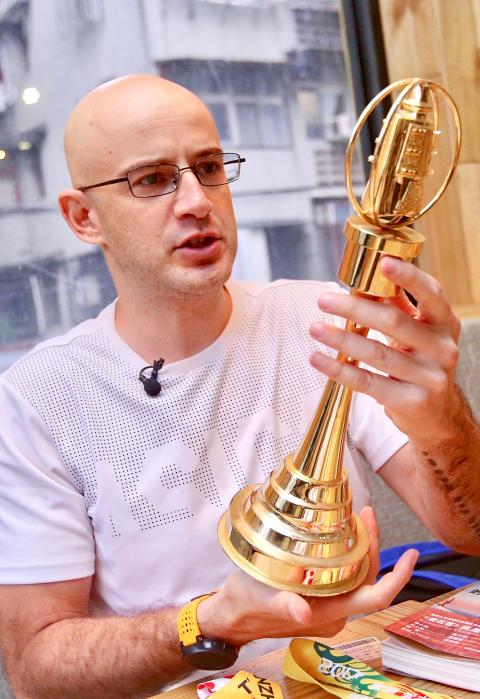Turkish comedian and TV host Ugur Rifat Karlova said he feels he has become a “real Taiwanese” after getting his Republic of China (ROC) identification card last month under an amended immigration law that allows foreigners with “special talent” to gain citizenship without having to renounce their original nationality.
“From now on, no one can call me laowai (老外),” said Karlova, referring to an informal Mandarin word for “foreigner.”
“After I got the ID, I felt like a Taiwanese and I wanted to do more things for Taiwan, the future of Taiwan,” said Karlova, 37, one of 23 foreigners who became citizens under the Standards for Defining High-Level Professionals for Naturalization (歸化國籍之高級專業人才認定標準), which went into effect in March last year.

Photo: CNA
“It was a sense of belonging that money can’t buy, a sense of happiness of being at home,” he added.
Despite having stayed in Taiwan for only 12 years, Karlova, better known by his Chinese name Wu Feng (吳鳳), said he hopes his naturalization will encourage other foreign residents to contribute more.
“I want to tell all foreigners that if you come to Taiwan, you need to cherish the society here,” Karlova said, adding that he wants to send a message to the public that foreigners can create more value for Taiwan, given the chance.
Karlova is the host of a TV travel show called iWalker, which won him a Best Host award at the Golden Bell Awards in 2012. He was the first foreigner to win the award.
He was recognized by the government for distinguished achievement in the field of art and culture, one of six categories of achievement for which foreigners can retain their original citizenship while receiving an ROC identity card.
His naturalization made Karlova the first foreigner to be granted citizenship in that category.
One of the biggest benefits of gaining ROC citizenship is that he can express his views about Taiwanese politics, society and culture on what Karlova describes as “more legitimate grounds.”
Karlova also feels pressure to live up to this recognition of both his reputation and the international image of Turkey, he said.
After graduating from Ankara University’s Department of Chinese and Sinology in 2006, Karlova came to Taiwan on a scholarship and attained a master’s degree in political science from National Taiwan Normal University.
He chose Taiwan because his teachers and schoolmates who had previously been to Taiwan had good things to say about it, he said.
Karlova entered show business after being invited by a scout to play the late George Leslie Mackay, a respected missionary in Taiwan, in a TV program. He married a Taiwanese woman three years ago and they have a two-year-old child.
Karlova said he plans to promote exchanges between Turkey and Taiwan by encouraging more Turkish businesses to invest in Taiwan, inviting YouTubers to come and promote Taiwan and introducing Turkey to Taiwanese.

Chinese Nationalist Party (KMT) Chairman Eric Chu (朱立倫), spokeswoman Yang Chih-yu (楊智伃) and Legislator Hsieh Lung-chieh (謝龍介) would be summoned by police for questioning for leading an illegal assembly on Thursday evening last week, Minister of the Interior Liu Shyh-fang (劉世芳) said today. The three KMT officials led an assembly outside the Taipei City Prosecutors’ Office, a restricted area where public assembly is not allowed, protesting the questioning of several KMT staff and searches of KMT headquarters and offices in a recall petition forgery case. Chu, Yang and Hsieh are all suspected of contravening the Assembly and Parade Act (集會遊行法) by holding

PRAISE: Japanese visitor Takashi Kubota said the Taiwanese temple architecture images showcased in the AI Art Gallery were the most impressive displays he saw Taiwan does not have an official pavilion at the World Expo in Osaka, Japan, because of its diplomatic predicament, but the government-backed Tech World pavilion is drawing interest with its unique recreations of works by Taiwanese artists. The pavilion features an artificial intelligence (AI)-based art gallery showcasing works of famous Taiwanese artists from the Japanese colonial period using innovative technologies. Among its main simulated displays are Eastern gouache paintings by Chen Chin (陳進), Lin Yu-shan (林玉山) and Kuo Hsueh-hu (郭雪湖), who were the three young Taiwanese painters selected for the East Asian Painting exhibition in 1927. Gouache is a water-based

Taiwan would welcome the return of Honduras as a diplomatic ally if its next president decides to make such a move, Minister of Foreign Affairs Lin Chia-lung (林佳龍) said yesterday. “Of course, we would welcome Honduras if they want to restore diplomatic ties with Taiwan after their elections,” Lin said at a meeting of the legislature’s Foreign Affairs and National Defense Committee, when asked to comment on statements made by two of the three Honduran presidential candidates during the presidential campaign in the Central American country. Taiwan is paying close attention to the region as a whole in the wake of a

OFF-TARGET: More than 30,000 participants were expected to take part in the Games next month, but only 6,550 foreign and 19,400 Taiwanese athletes have registered Taipei city councilors yesterday blasted the organizers of next month’s World Masters Games over sudden timetable and venue changes, which they said have caused thousands of participants to back out of the international sporting event, among other organizational issues. They also cited visa delays and political interference by China as reasons many foreign athletes are requesting refunds for the event, to be held from May 17 to 30. Jointly organized by the Taipei and New Taipei City governments, the games have been rocked by numerous controversies since preparations began in 2020. Taipei City Councilor Lin Yen-feng (林延鳳) said yesterday that new measures by